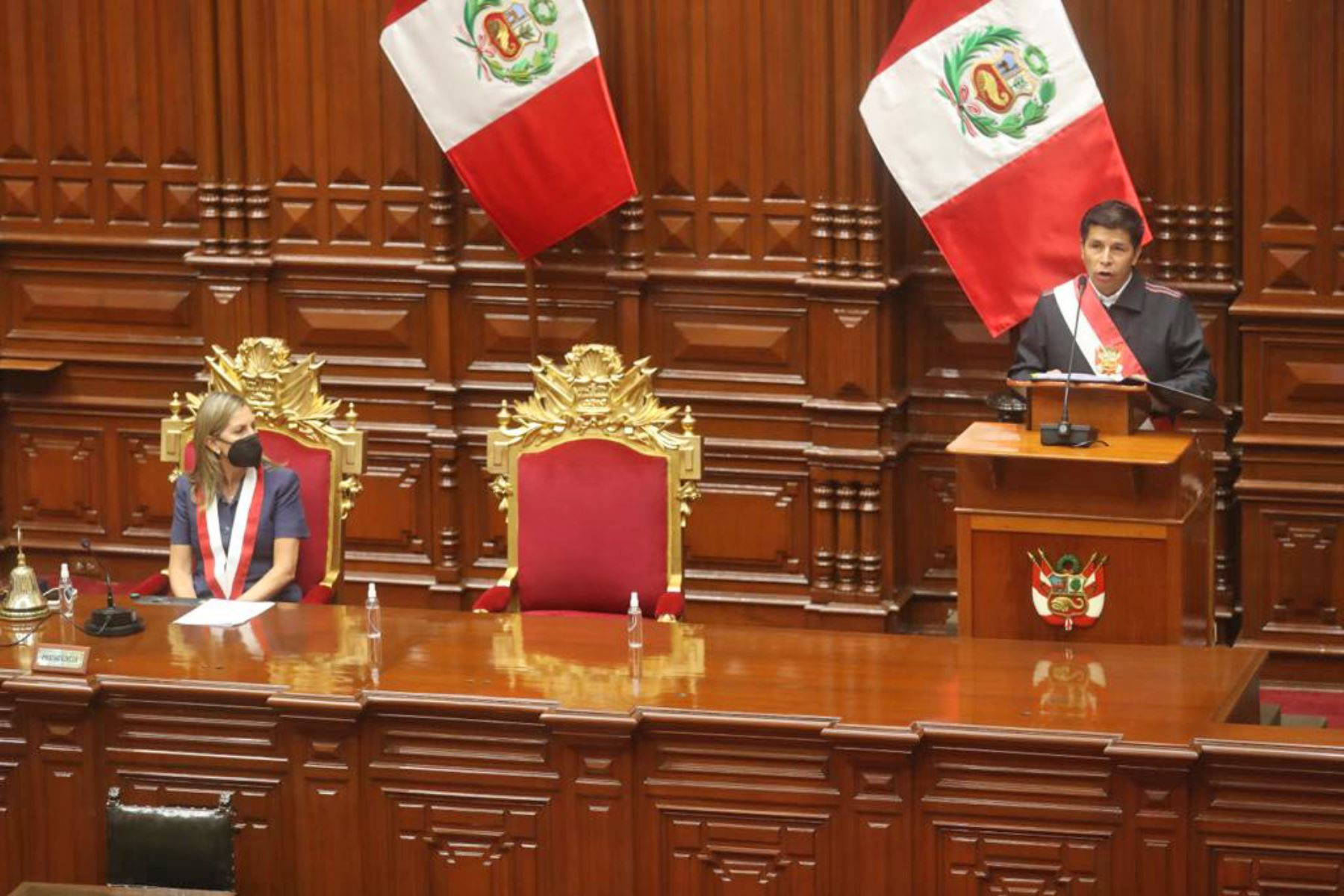:quality(85)/cloudfront-us-east-1.images.arcpublishing.com/infobae/6KALTJBOVJAIPP42VBQFTWHYKE.jpg 420w)
President Pedro Castillo delivered a message to the Congress of the Republic thirteen days after he appeared there to answer for the vacancy motion. To analyze its content, Infobae interviewed political scientist José Alejandro Godoy, who points out that the fundamental problem of the presidential speech was the total absence of an objective.
For the professor at the Pontificia Universidad Católica del Peru, President Castillo's call to the National Agreement to dialogue with the opposition would be of great relevance in the midst of such a polarized juncture between the two branches of State.
- Was it a non-aggression pact message?
- Yes. If you want to explain what the intention of the message is to have a kind of non-aggression pact. I think the president knows that, for now, Congress doesn't have enough votes to empty it. And, on the other hand, the Government has basically no legal tools to be able to make an advance on elections because it doesn't have the votes either.
- There were rumors about a project to move the elections forward. The president, in the end, did not do it. What would have happened if President Castillo dared to present it?
- Probably, at that time, he [Castillo] would not have succeeded in this situation. The initiative would not have had the votes for it to be realized. It is clear that there is a hard core of congressmen who are betting on a presidential relay. That is, the president should leave but not the Congress of the Republic.
- It seems that the message has been addressed to the public with the aim of getting a little out of the corruption scandals. An account of everything he has done and has it in mind for later.
- It is the same rhetoric of the messages of July 28, which, normally, end up being a kind of a state of laundry of all the things that each sector does and there is no emphasis, let's say, on the questions it has to answer. There is no very clear strategy and there is only one non-aggression pact. In addition, the president wastes several minutes basically looking for things to be done at last. The problem is that there is no clear initiative, there is no big announcement and not even a great achievement to show. So, let's say, you see that there has been no planning of what you wanted to look for with this message.
- A conciliatory message and what it will do. This will already be verified by the figures and analyzes of specialists.
- Yes, but beyond that, I think that seeing it strictly from communication, the problem here is that the president of the republic does not choose one or two topics to delve into and what he does is a list, in which simply and simply nothing remains to be said. So, let's say, everything ends up being lost.

- It seems to be a message with generalities.
- I think there's some strategy there, too. If I delved into the details, I probably would have given ammunition to the opposition.
- The president also referred to the complaints to be answered by Congress on the 28th. Did you make the necessary clarifications on the Karelim López case or the departure to sea for Bolivia?
- I think that the main problem of the complaints that have been lodged has not been sufficiently explained and I do not know if a message to the nation is the best space to be able to explain such complaints in a very clear way. On the other hand, in fact, until now we have seen that in the complaints there is no basis for reaching a vacancy due to moral incapacity.
- But it was a preview of what he'll have to say.
- It might seem like it, but so far we don't know. Probably, the president can decide to leave his lawyer his legal defense before Congress.
- What were the omissions?
- The fundamental problem of the message is the total absence of a goal. What was done more than saying missing this topic or announcing something. I believe that, rather, it reflects the disorder of the Government and the situation in which they simply and simply do not have a clarity of what to do. And, on the other hand, let's say, there is no purpose to amend the course they have taken. It's the feeling that the message leaves.
- The president has also proposed that he will present reforms and called in the last part for the convening of the National Agreement. How feasible could it be at this juncture?
- The proposal related to the National Agreement is an issue, let's say, it usually happens. It is not something that, necessarily, is new. Plain and simple, what happens is that the National Agreement is resorted to when there is no longer dialogue. It is a space for consultation, but it has lately become a tailor's drawer when a president is in trouble.
- You believe that the National Accord would not have much strength to lower political tension.
- The problem is what the National Accord is for.
- The president also took advantage of his message to list a series of actions taken by Congress. How should the opposition take these criticisms?
- In that part, the president is somewhat right. There is no doubt that there is a sector of Congress in promoting the vacancy of President Castillo. Now, of course, that is more aimed at three benches such as Fuerza Popular, Avanza Pais and Popular Renewal that are not going to change their attitude towards the president. It is part of a narrative by President Castillo, who points out that there has been no restriction on the political behavior of these benches after the electoral contest.
KEEP READING:



